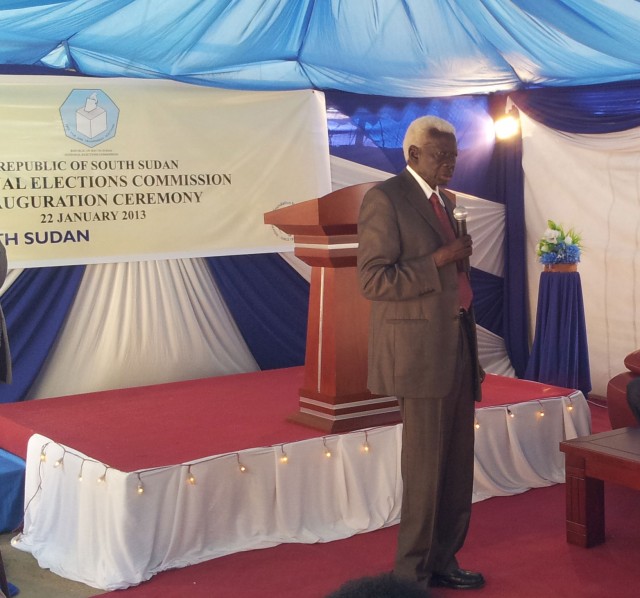
Soudan du Sud 2010 élections et 2011 Le référendum est peut-être les seules expériences positives que les Soudanes du Sud ont eues avec les processus politiques dans leur courte histoire - et les institutions électorales qui les ont organisées sont vitales pour le processus de paix continu du pays et dans son avenir politique. Alors pourquoi le soutien international à la Commission électorale nationale s'arrête-t-il?
Dans les sociétés sujettes aux conflits et divisées, L'indépendance de l'organisme de gestion des élections est une caractéristique clé qui peut avoir un impact significatif sur la consolidation de la paix.
La Commission électorale du Soudan du Sud a été créée comme un organisme indépendant du gouvernement avec le pouvoir de réglementer, organiser et superviser les événements électoraux; établir une délimitation des limites; Organiser l'inscription des électeurs; et dispenser une éducation civique. Autrement dit, Cela décidera des questions hautement politisées. Toute faute professionnelle réelle ou perçue pourrait saper la crédibilité des élections et entraîner une violence renouvelée.
Malheureusement, Les premières tâches de la Commission se déroulent actuellement sans aucun avis international ou d'autres types de soutien. Avec le Soudan du Sud ayant peu d'expérience avec les processus démocratiques, Tous les commissaires étant nouveaux dans le travail et l'organisation des élections, Les chances d'élections crédibles sont faibles sans orientation internationale.
Le problème n'est pas des ressources. Les États-Unis. Agence pour le développement international (USAID) a presque $75 millions disponibles pour un soutien immédiat aux processus politiques au Soudan du Sud, y compris le soutien à la Commission électorale. Les Nations Unies ont identifié les exigences d'assistance technique pour la commission. Autres donateurs, comme l'Union européenne et le Département canadien des affaires étrangères, Le commerce et le développement ont également indiqué son intention de soutenir la commission.
Plutôt, Le fait de ne pas soutenir la commission électorale est due à une mauvaise analyse: Peu de temps après le déclenchement de la violence en décembre 2013, La communauté internationale a décidé que le soutien à la Commission électorale équivaut à soutenir le gouvernement. C'est à courte vue, cependant.
La Commission a été créée par la loi sur les élections nationales en juillet 2012, Les commissaires nommés par le président et confirmés par l'Assemblée législative nationale et l'institution ont soutenu politiquement et financièrement par la communauté internationale, principalement les États-Unis.
Compte tenu des développements en décembre et de la violence subséquente qui a suivi, Se concentrer sur l'assistance humanitaire est entièrement justifiable. Mais comme d'autres services et soutien sont rétablis au Soudan du Sud, La préparation des élections futures est la clé pour soutenir le processus de paix.
Il y a trois raisons clés pour que la poursuite de soutenir la Commission électorale est maintenant essentielle aux objectifs plus larges de la communauté internationale au Soudan du Sud.
D'abord, Le retrait du soutien international à la Commission n'est plus susceptible de rendre la commission vulnérable à l'influence du gouvernement et sensible aux perceptions du biais. Si nous permettons à la commission d'être «capturée» d'un côté, Il sera encore plus difficile de préparer des élections crédibles.
Deuxième, Chaque fois que nous avons une situation comparable, Les experts déplorent le calendrier comprimé en vertu desquels les élections sont tenues et affirment qu'il aurait été utile d'avoir eu plus de temps pour développer des institutions et des systèmes nécessaires pour organiser une élection crédible.
Et troisième, On ne sait pas quand les dirigeants politiques peuvent décider que les élections sont nécessaires, Donc, être prêt à mener une élection sur le moins de préavis que possible est un moyen important de soutenir le processus de paix. Cette semaine, les parties au conflit ont annoncé l'intention de former un gouvernement d'unité au sein 60 jours. Ceci est un rappel que les processus politiques ont leur propre vie et ils ne devraient pas être retenus par l'incapacité à faire des préparatifs techniques.
Tous ces trois peuvent être traités si les ressources existantes sont utilisées immédiatement.
Tihana Bartulac Blanc est un associé principal spécialisé dans les élections de Creative Associates International. Creative est un sous-traitant du projet de réussite financé par l'USAID à Democracy International au Soudan du Sud. Les opinions de cet article sont MS. Bartulac Blanc’S seul.